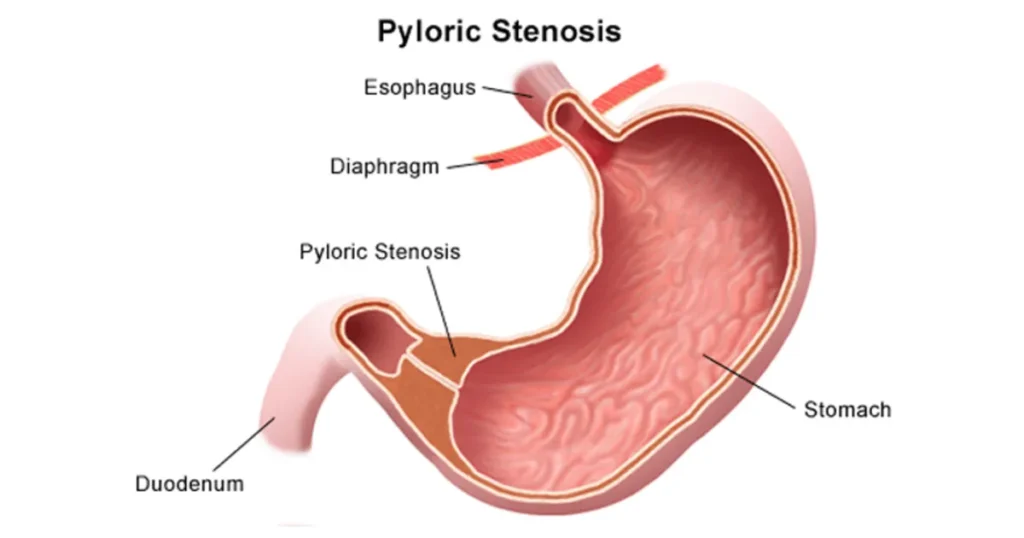Vomit does worry many parents, especially because of the common concern that it’s a sign of something being seriously wrong within their kids. However, while infants and kids are definitely more delicate and require more attention, there are one’s and accumulated cases is to more serious underlying issues which going unnoticed.
Therefore, this article will discuss ages of vomiting in babies and kids while looking at the interventions to manage and prevent it. Furthermore, it will try to emphasize the need for parental guidance in looking for when vomiting becomes a problem in this regard.
Causes of Vomiting In babies and kids
Gastroenteritis
Gastroenteritis, or stomach flu, is regarded as one of the biggest causes of vomiting in infants and children. This infection is viral or bacterial, and causes inflammation in the stomach and intestines. It is most often recognized through signs of vomiting, diarrhea, stomach pain and fever.
It can be caused by retrovirus among others, and that can spread through contaminated food, water and contact with infected people. While gastroenteritis is self limiting, children should be helped to drink a lot in order to avoid dehydration.
Food Allergies Or Food Intolerance
Another important and frequently overlooked cause of vomiting in infants and children is food allergies and food intolerance. Milk, eggs, peanuts, and wheat as some of the common triggering foods can cause it. However, unlike allergies rather than an immune response food intolerance, like lactose intolerance do trigger digestive disturbance. In either case, vomiting may occur immediately after taking these kinds of food.
Other symptoms may include stomach cramps, diarrhea, symptoms of hives, or shortness of breath. If you think a food allergy could be the reason, go and see a doctor who would perform the requisite upset and diagnosis.
Motion Sickness
Motion sickness is a widespread cause of vomiting among children primarily during traveling in a vehicle over a long period of time. It is caused by the mismatches in the inner ear, the eyes, and the brain which are in charge of movement and balance. Because of such a mismatch, kids could complain and will feel dizzy and eventually, may vomit.
Young children are more affected by motion sickness, but usually, this is one condition that most children outgrow. It is also helpful to avoid looking sideways at moving objects as well as to avoid strong smells or foods for travel fatigue.

Overfeeding in Babies
Infants rather and babies in particular newborns, vomit overfeeding very often explains vomiting within this context. Since their stomach is quite small and can bear only small doses of milk, their digestive system can easily be strained. This means that they may throw up or vomit after being fed.
It has been demonstrated by reliable sources that it is feasible to raise the risk of vomiting by providing babies with food in large volumes. Adding to this pushes out trapped air out so that the baby has moderate amounts of gas so that vomiting is minimized.
GERD
Gastroesophageal reflux disease GERD refers to an illness in which the contents of the stomach regurgitate into the tissues of the esophagus and induce the person to vomit. In infants, the reason for GERD is an immature esophageal sphincter which permits the return of food along with acid. It ends up vomit in babies especially after feeding or spitting up frequently.
Such signs can also include general irritability, avoidance of feeding, coughing or choking. In the majority of circumstances GERD subsids with adjustment in age but for highlight cases appropriate medication in required.
Infections Other Than Gastroenteritis
Any infection other than gastroenteritis such as urinary tract infections (UTIs), ear infection, and respiratory infection may also be responsible for vomiting in children. So, for instance, a child can vomit due to high fever associated with a respiratory infection or due to persistent cough. If infections are responsible, other signs and symptoms such as fever, lethargy or irritability are likely to be present as well.
When vomiting occurs, and other signs or symptoms of infection are present, it is important to have an immediate urgent care to establish the cause and cause specific treatment.
Appendicitis
An extremely uncommon infection that may cause vomiting in progression of child diseases is appendicitis. This condition arises when the appendix is inflamed, and is most often associated with crampy pain that begins at the belly button and localizes to the lower right quadrant of the abdomen. Abdominal ache, vomiting, loss of appetite, fever and constipation could be strung together in appendicitis.
Signs and symptoms of appendicitis often include vomiting that always follows the first episode of abdominal pain. Appendicitis is an acute condition that can lead to life threatening consequences and involves surgical procedures to remove an inflamed appendix.
Allergy to Cow’s Milk Protein
It is possible that some infants have a cow’s milk protein allergy and will vomit after being fed formula or breast milk containing dairy products. This condition, known as milk protein allergy, causes the body’s immune system to react , presenting with digestive discomfort, such as vomiting, diarrhea, and bloody stools.
These infants may also be irritable or develop skin rashes, and inability to gain weight properly. Most children recover from milk protein intolerance by the age of 3 years, but a pediatrician should be consulted for suitable weaning foods and diet.
Pyloric Stenosis
Pyloric stenosis refers to the condition characterized by the muscular structure at the pylorus becoming more rigid, so that food does not pass into the small intestine. This condition manifests itself as severe vomiting that can shoot out of the mouth in babies from around three to five weeks of age.
It is often non-bilious vomit which means, it does not contain bile vomit. Infants with pyloric stenosis may, however, appear hungry and experience vomiting several times but still do not gain normal body weight in case this condition persists. In cases such as these, the patient requires surgical intervention and prompt recognition of the problem.

Stress or Anxiety
Another mental factor which causes vomiting in children is emotional stress or anxiety. Conditions may also include nausea and vomiting in children who feel excessive stress due to school, social relationships or some other changes in their surroundings.
This kind of vomiting is referred to as functional vomiting and it is not caused by any underlying disease. Such stress induced vomiting can be managed by meeting the emotional requirements of the child, providing a conducive environment and eliminating the cause of worry.
Swallowing Air
In infants, swallowing air during feeding or while crying may result in vomiting. This is rather frequent with bottle fed infants when the caregiver does not position the bottle correctly, and the infant swallows excessity of air. The accumulation of air makes the baby uncomfortable, leading to either vomiting or spitting out.
To prevent this, the caregiver can burp the baby after feeding and use the specially designed bottles to evade intake of excess air.
Intestinal Obstruction
Intestinal obstruction refers to the blockage of the intestines causing interference in the passage of food. This can occur due to intussusception, where one segment of the bowel invaginates or moves abdominal or to a twisted bowel. The vomitus in intestinal obstruction is usually of the projectile type and may be green or yellow.
The child could additionally display abdominal swelling, abdominal tenderness and constipation. Intestinal obstructions are medical emergencies that require immediate attention.
How to take care of vomiting in babies and kids
In most cases, as with infants, managing vomiting in babies and kids is a function of the underlying cause. Then in moderate cases, the focus would be on preventing dehydration, and oral rehydration solutions will work effectively for this. Advise taking in small sips of water or other fluids that are electrolytic in nature so as to prevent dryness. Do not give them solid foods until the abdominal discomfort and nausea ceases from vomiting.
But for babies, breast or formula milk can be offered but in small amounts and more frequently. If the baby doesn’t stop vomiting for over 24 hours or theta’s noticeable signs of thirst, blood spots in the vomit , or extreme pain in abdominal regions etc. call the doctor for help immediately.
Preventing Vomiting in Babies and Kids
Some cases of vomiting may be preventable. For instance, avoiding baby overfeeding, controlling the diet of food intolerant children so that it is wholesome and safe, keeping away sick people from children and so on. In case motion sickness is an issue, consider applying anti nausea wrist bands or other medications as recommended by a doctor.
Hand washing and hygiene can also be used to prevent spread of infections that bring about vomiting.
When to See a Doctor
Many people tend to vomit from time to time and its occurrence is rarely a cause for concern since it usually clears up on its own. But some cases warrant seeking medical help. Go for medical assistance if there is severe abdominal pain accompanying vomiting, fever, dehydration, lethargy or if there is blood or bile in the vomits.
Nausea, vomiting and dehydration lasting longer than 24 hours in children or 12 hours in babies is a warning sign. The sooner you act, the lesser the complications, and the better your child’s health.

Conclusion
There is a number of reasons that may cause young infants and children to vomit such as viral infections or appendicitis and intestinal obstruction among others. Being informed about possible conditions helps most parents know what to do and when to get help.
Most types of vomiting are mild and do not require medical attention and can be treated by hydrating and resting. Gentle my child’s health is concerning, should I make a visit to a health care professional if I am concerned about my child’s health.
FAQs on Vomiting in Babies
Q: What are common causes of vomiting in babies?
A: Feeding practices, milk protein allergies, overfeeding, and gastroenteritis are some of the main reasons for vomiting in infants.
Q: How can I manage vomiting in my child?
A: Encourage them to drink fluids in small amounts and provide oral rehydration therapy while waiting for vomiting to settle before offering solid foods.
Q: When should I seek medical help for vomiting?
A: Seek medical attention if vomiting persists for more than 24 hours, if there are painful abdominal cramps, or if there is blood or bile in the vomit.
Q: Can food allergies cause vomiting in kids?
A: Yes, food allergies, especially to milk, eggs, peanuts, and other foods, can cause vomiting in children. If other signs are present, this becomes more certain.
Q: What measures can I take to stop my child from vomiting?
A: To limit vomiting, avoid overfeeding, practice good hygiene, and manage known food intolerances or allergies.

Russell F. Jones, holding a Master in psychology from the University of Florida. He writes for Smart Parent Solutions, offering practical advice on parenting and child development. His engaging content helps parents navigate family life with confidence and ease. Russell enjoys sharing his knowledge and spending quality time with his family.
